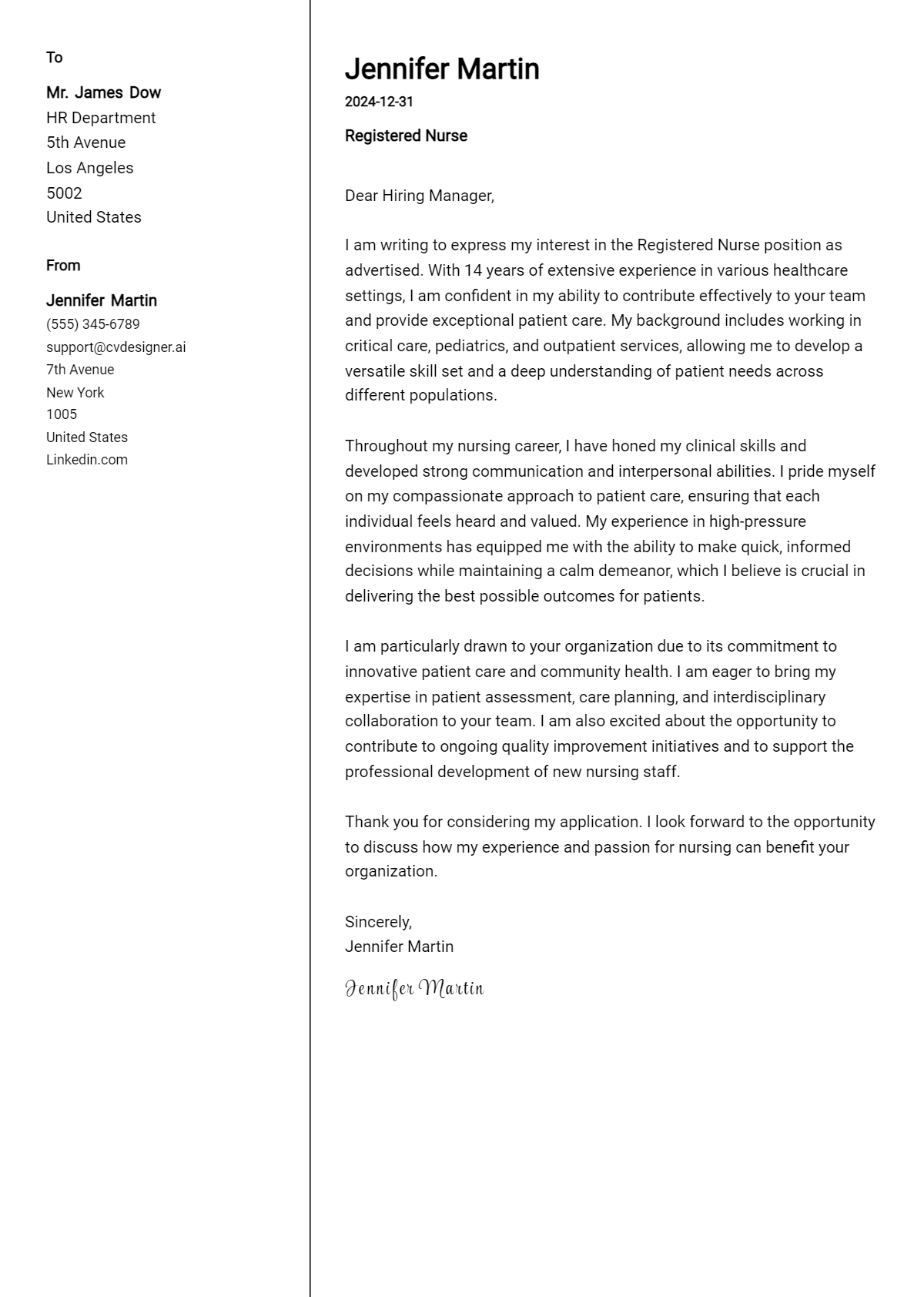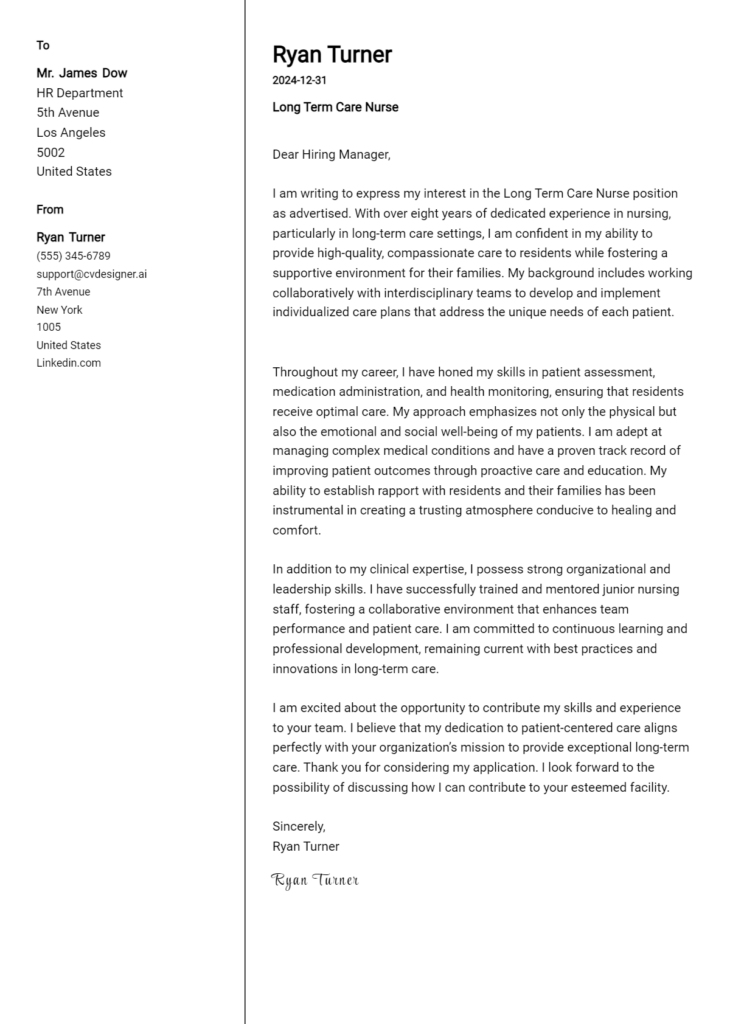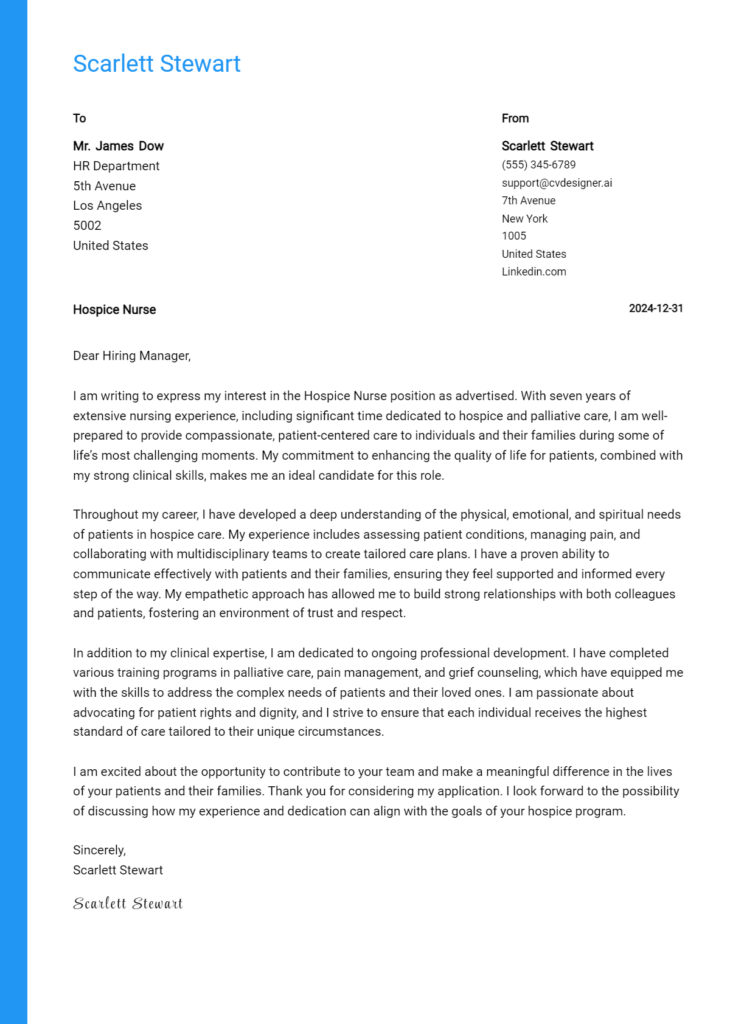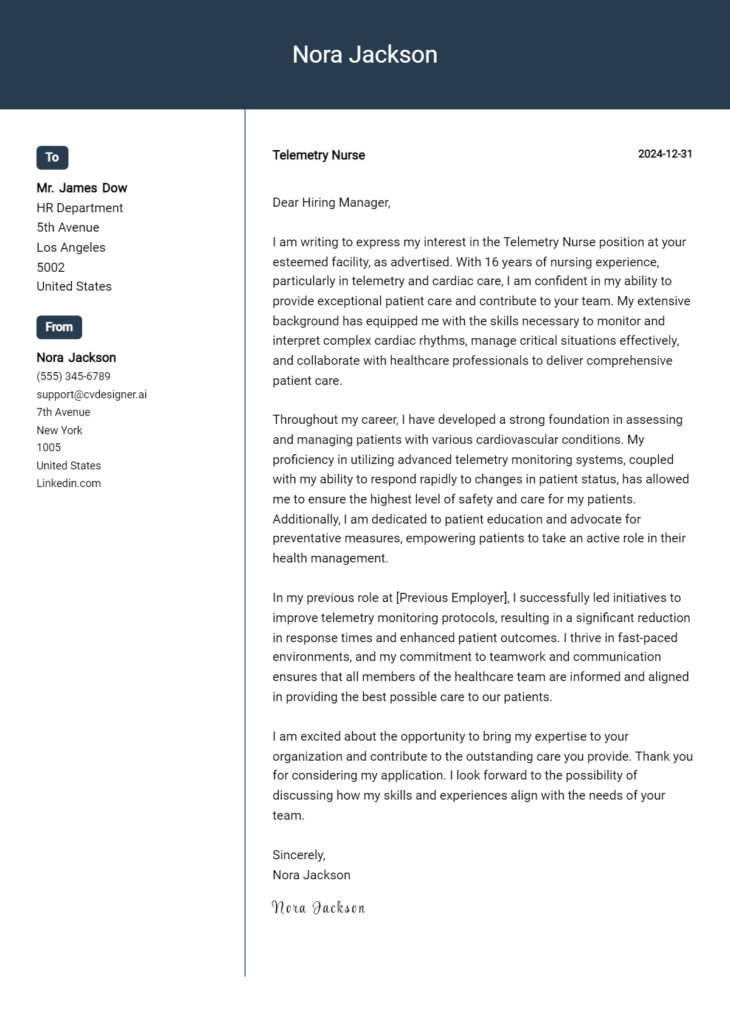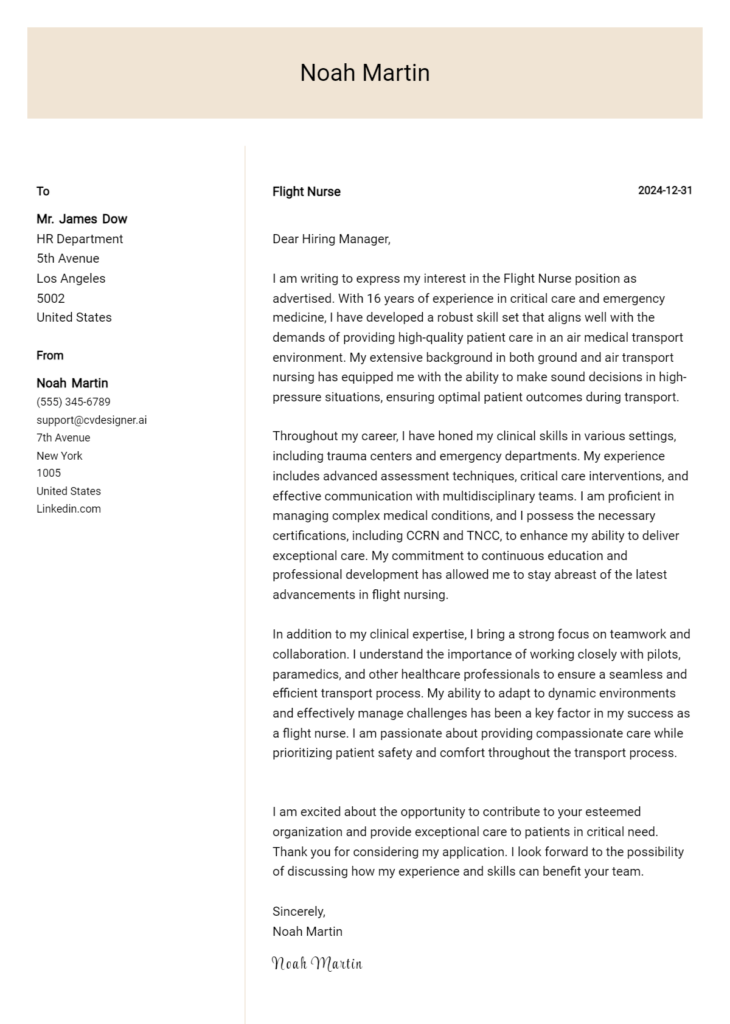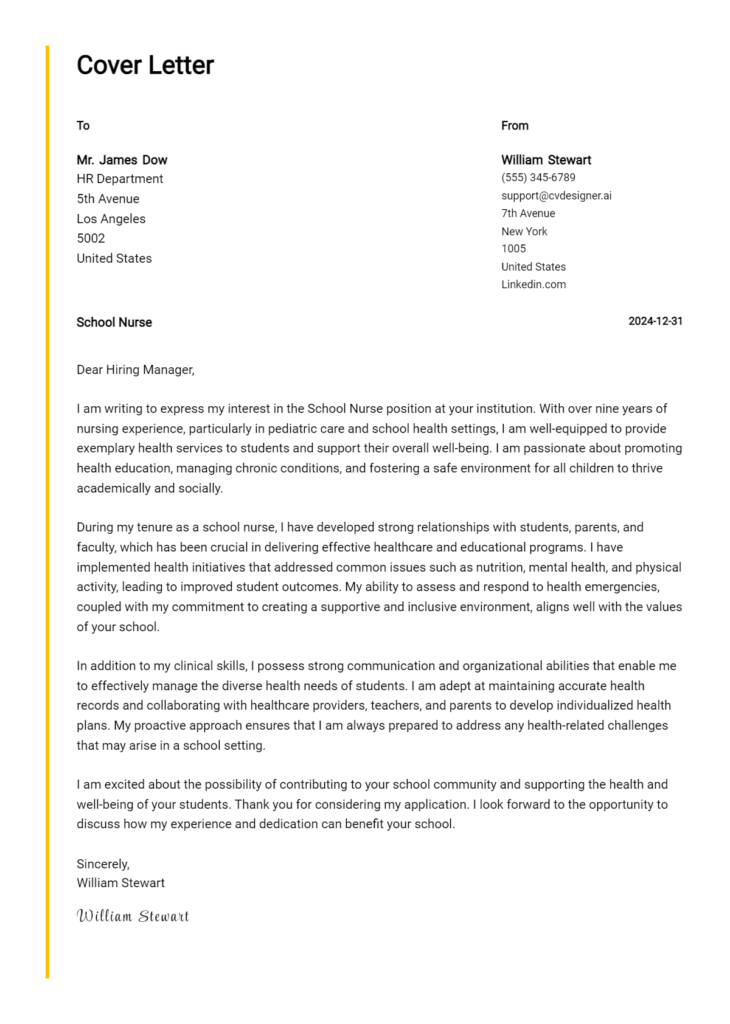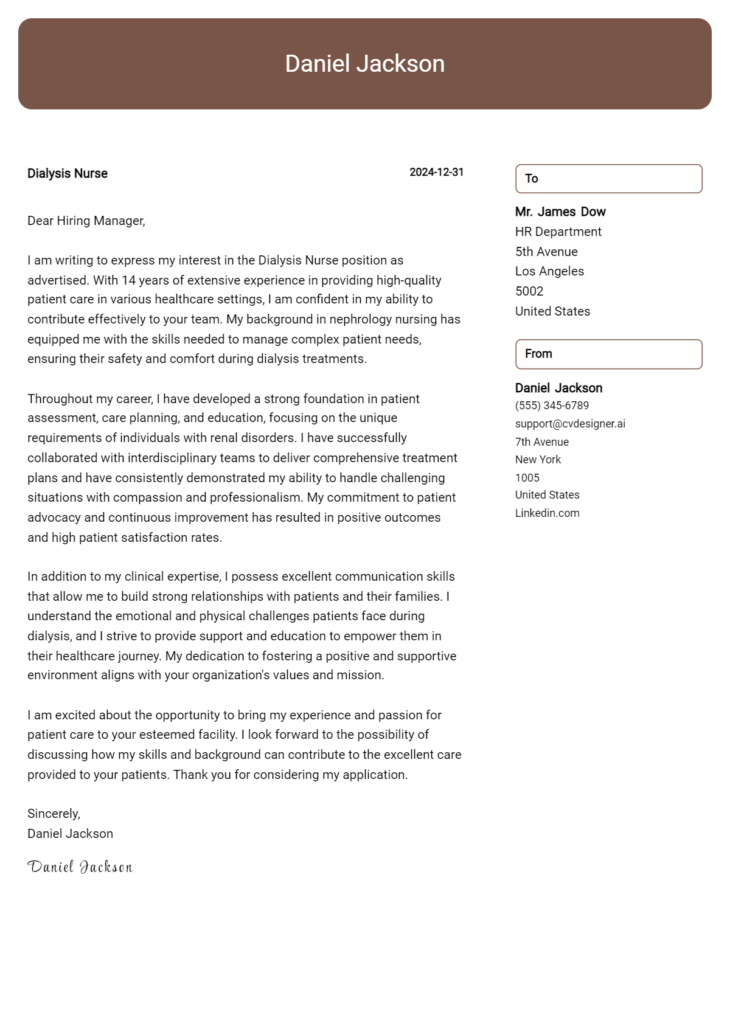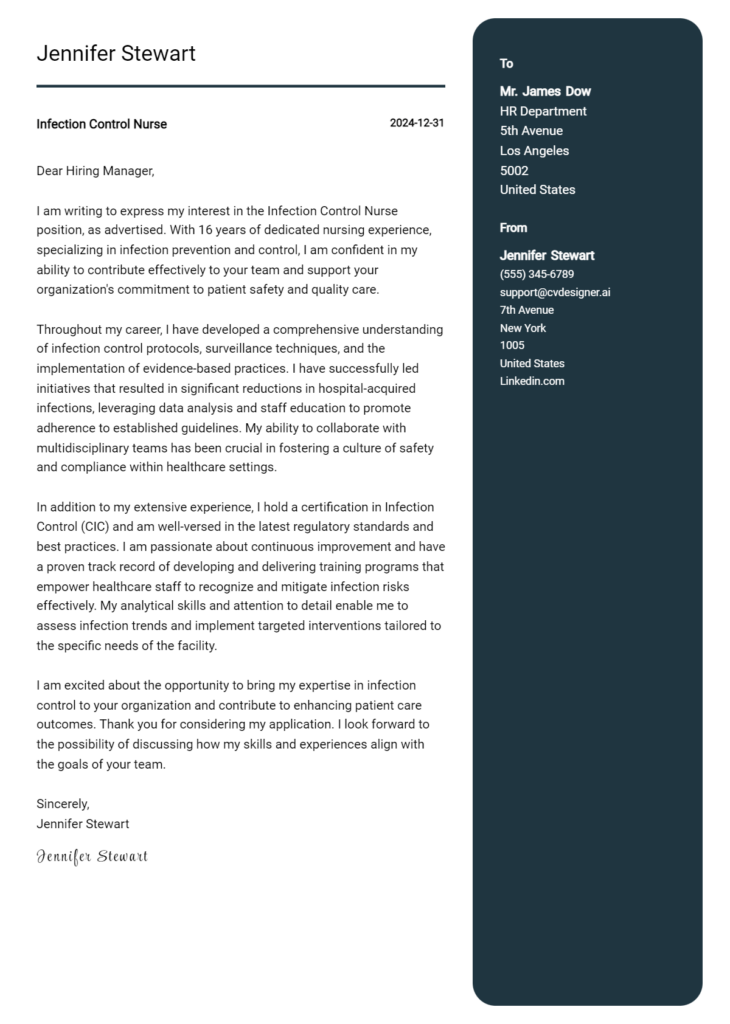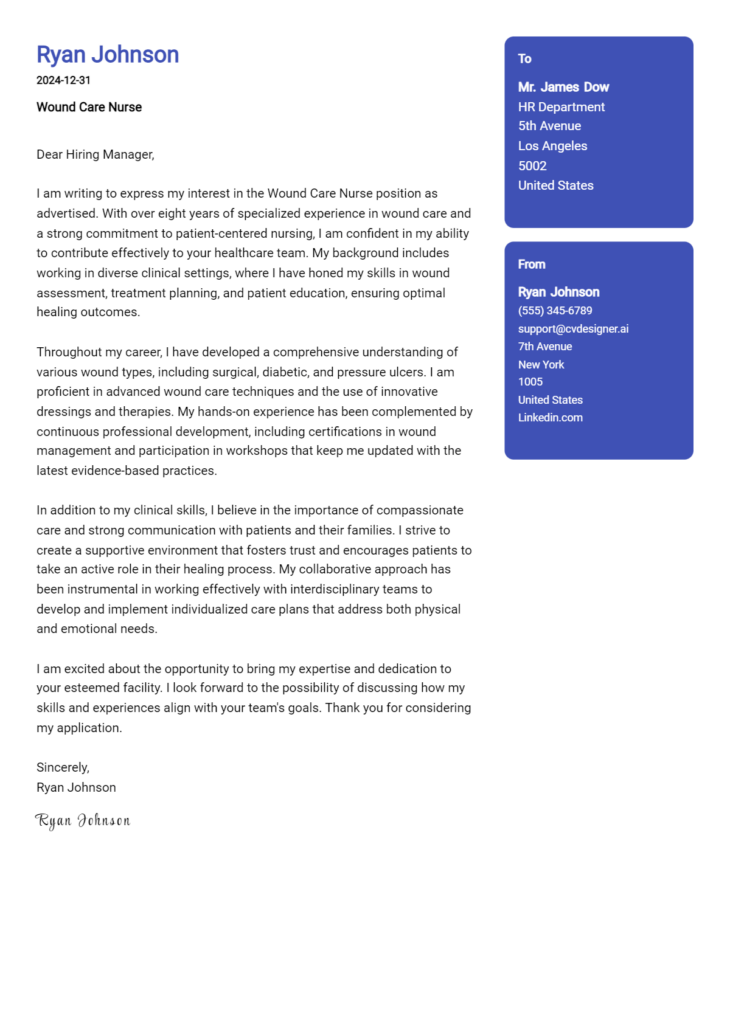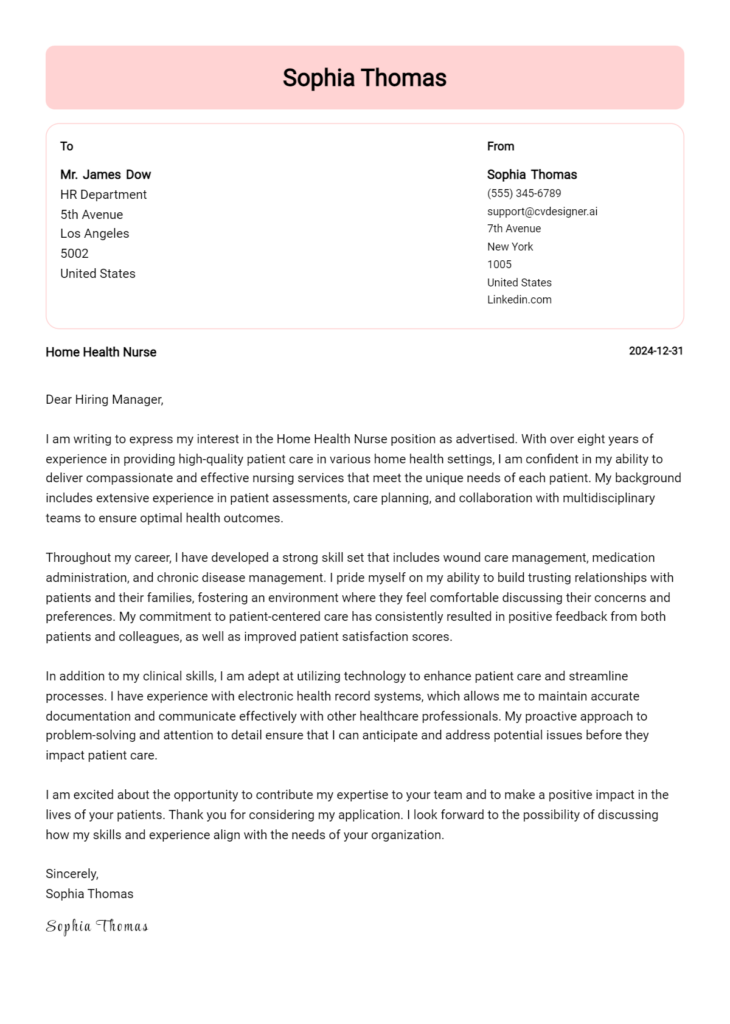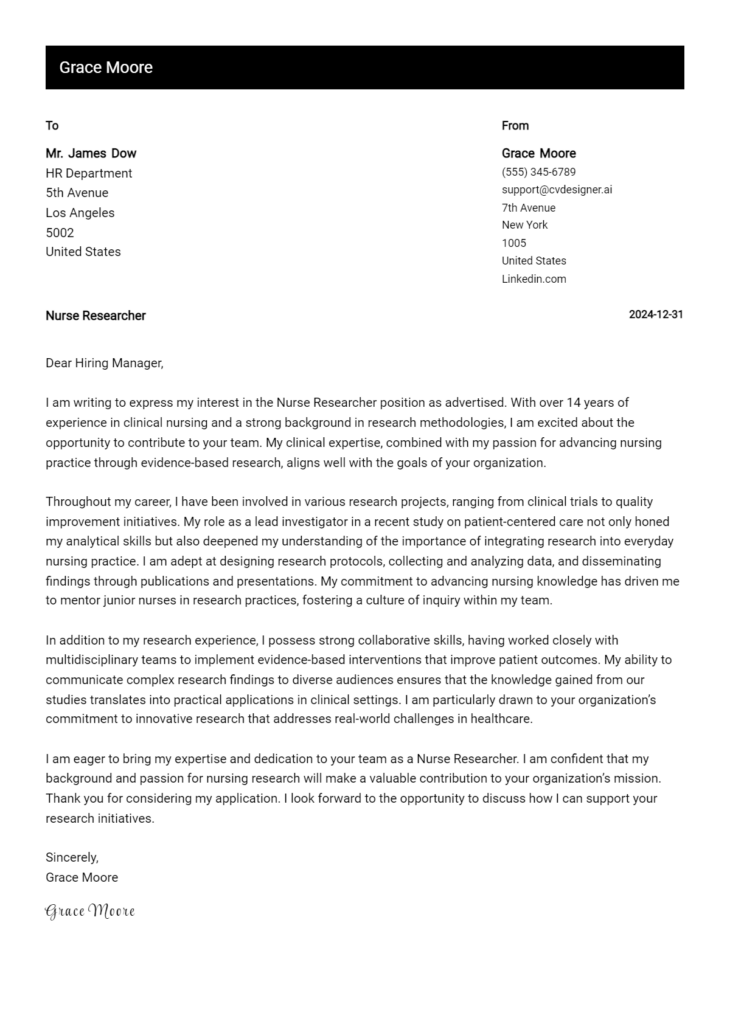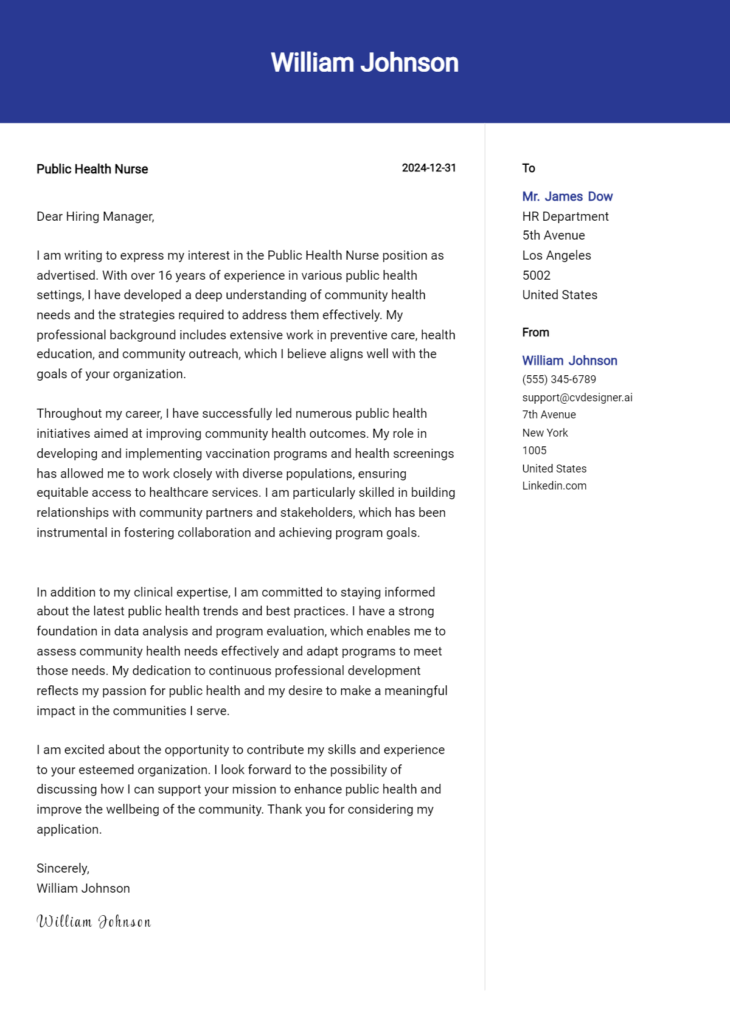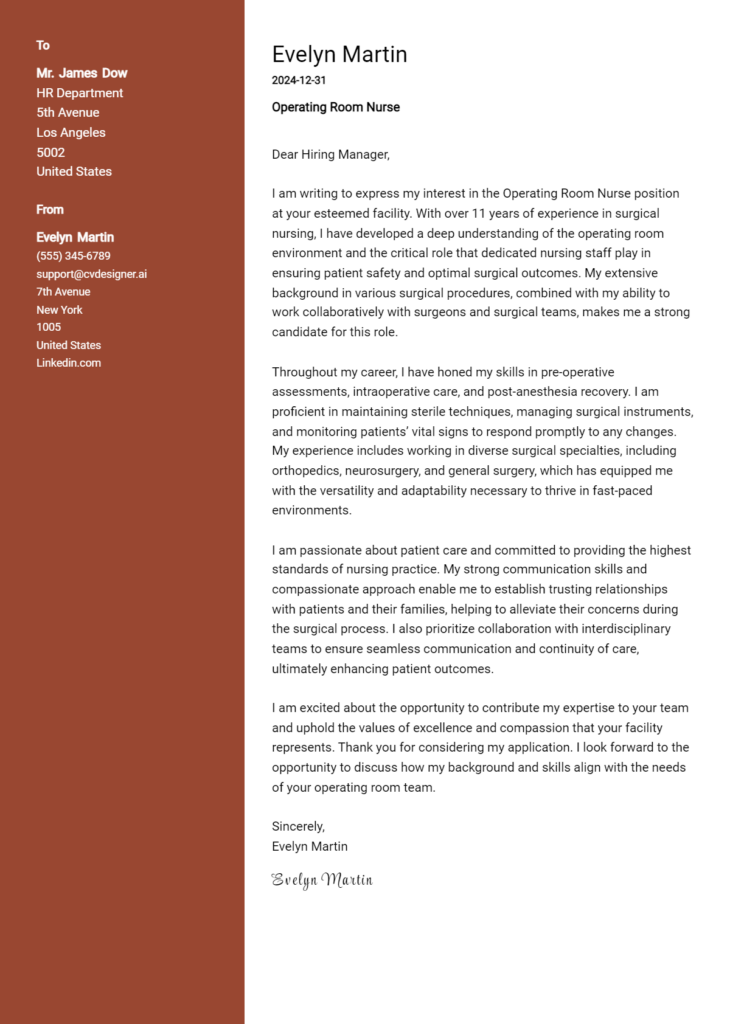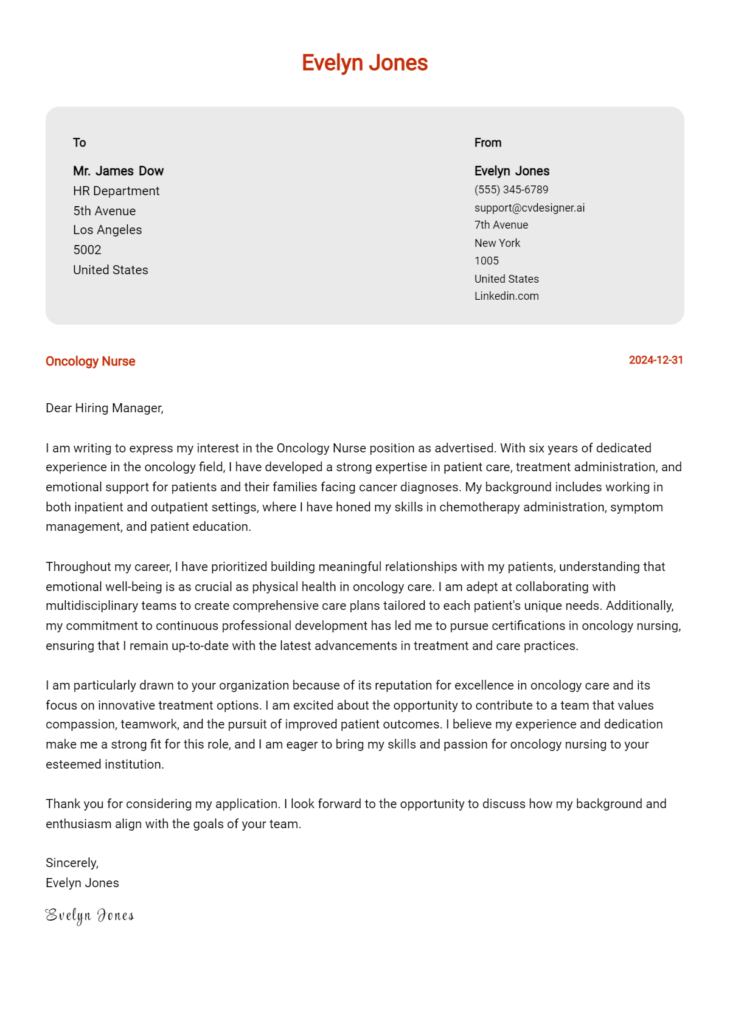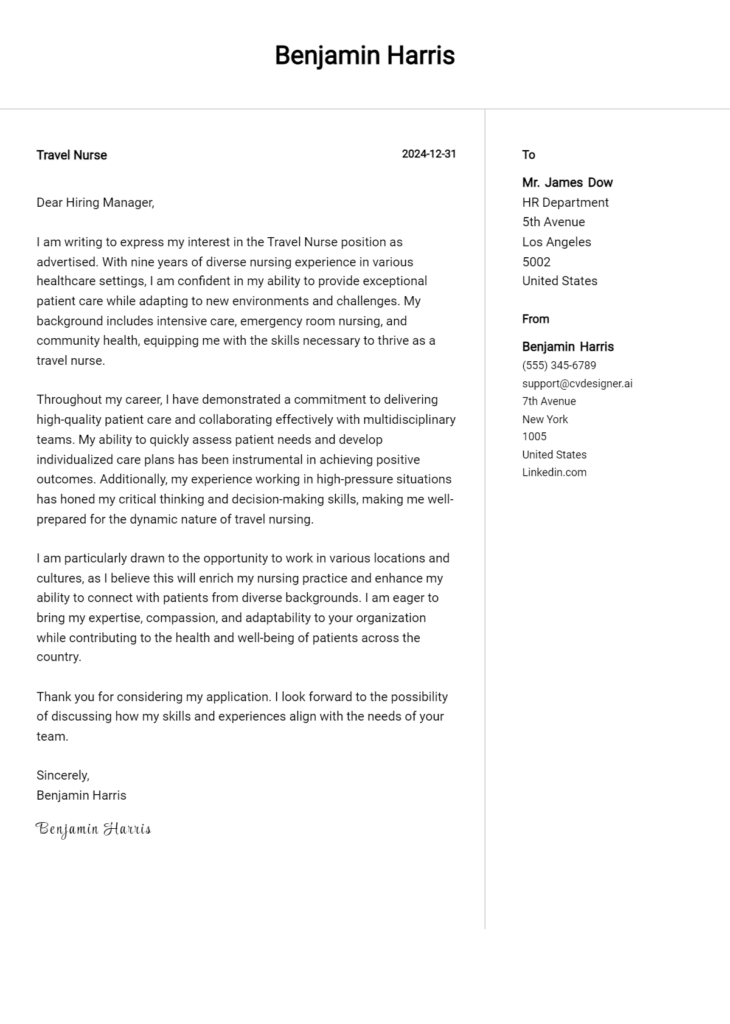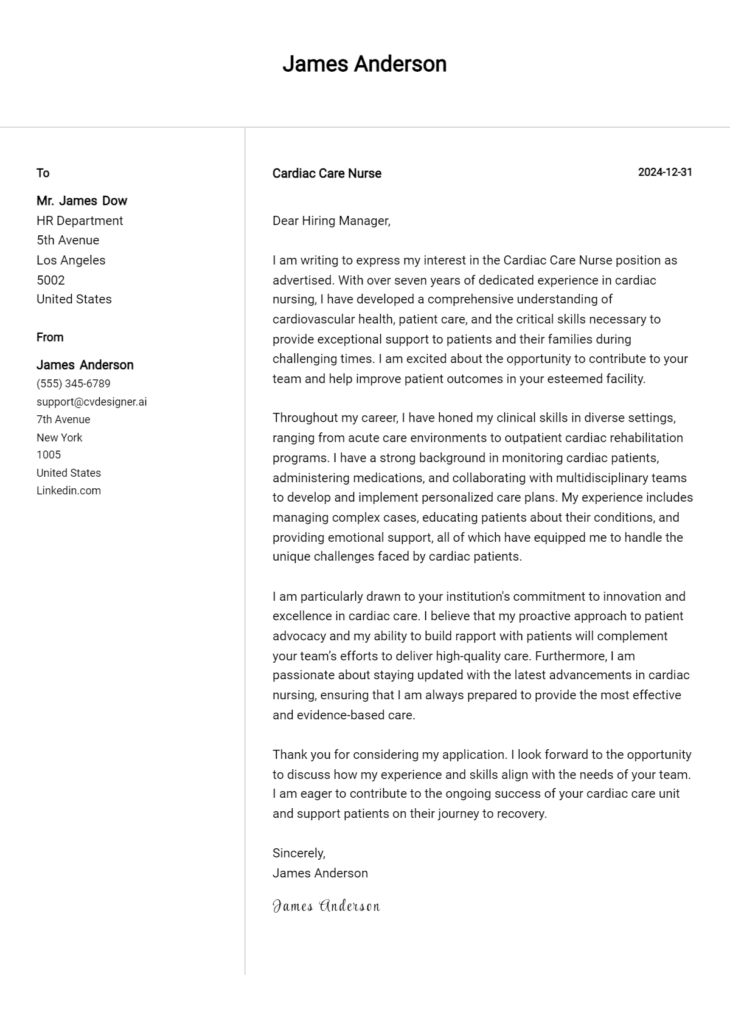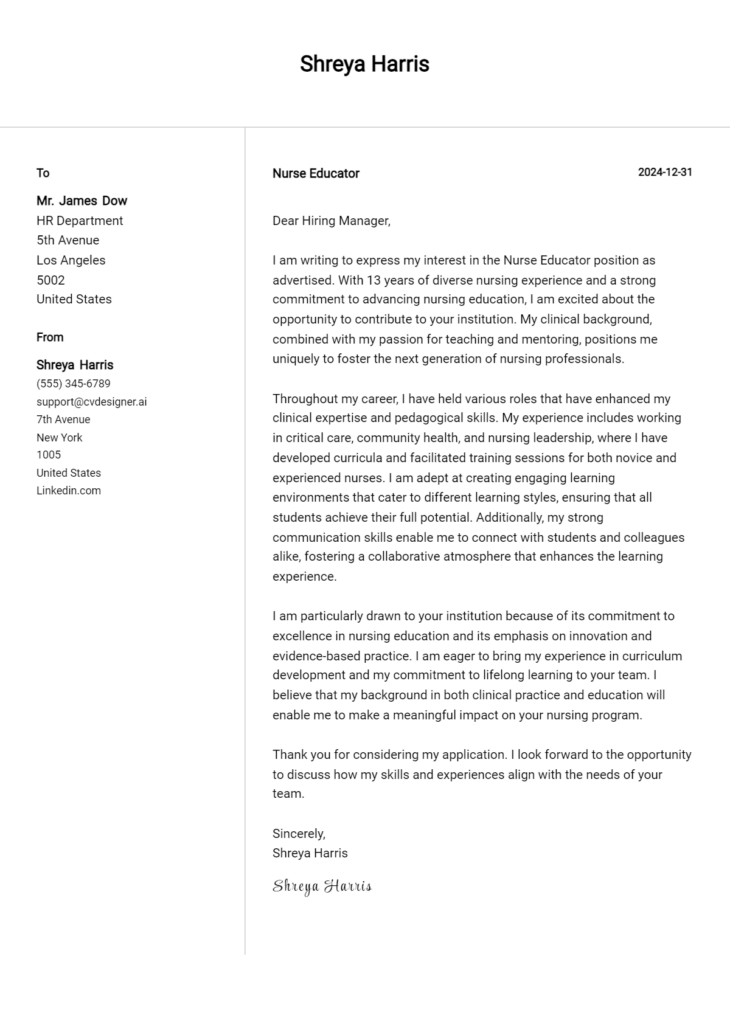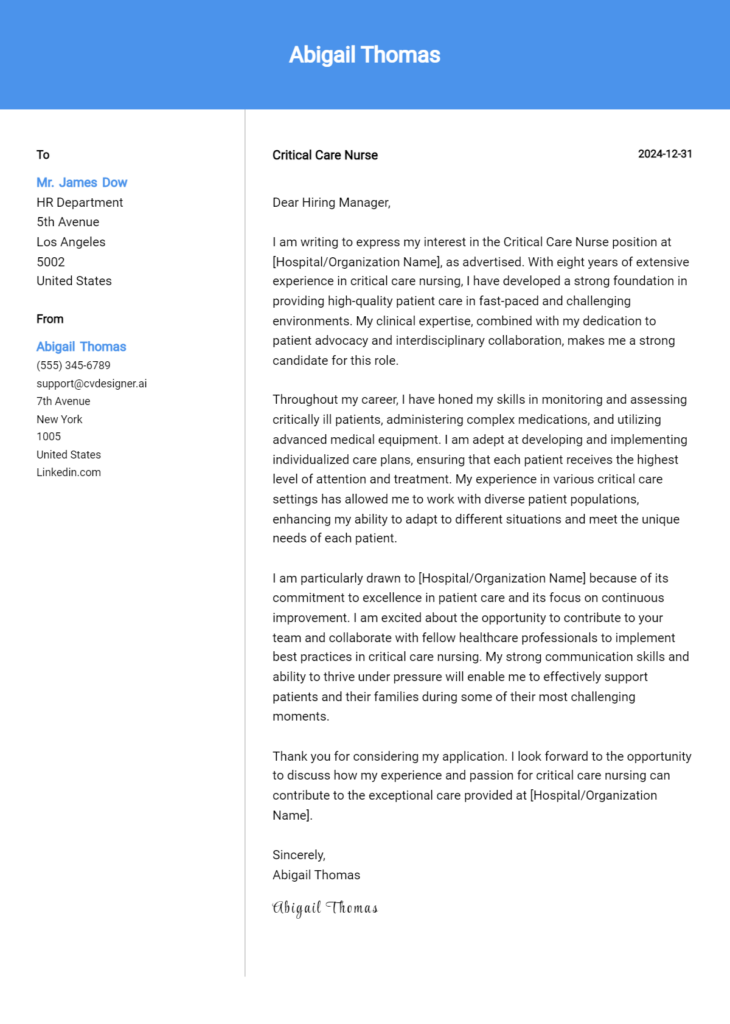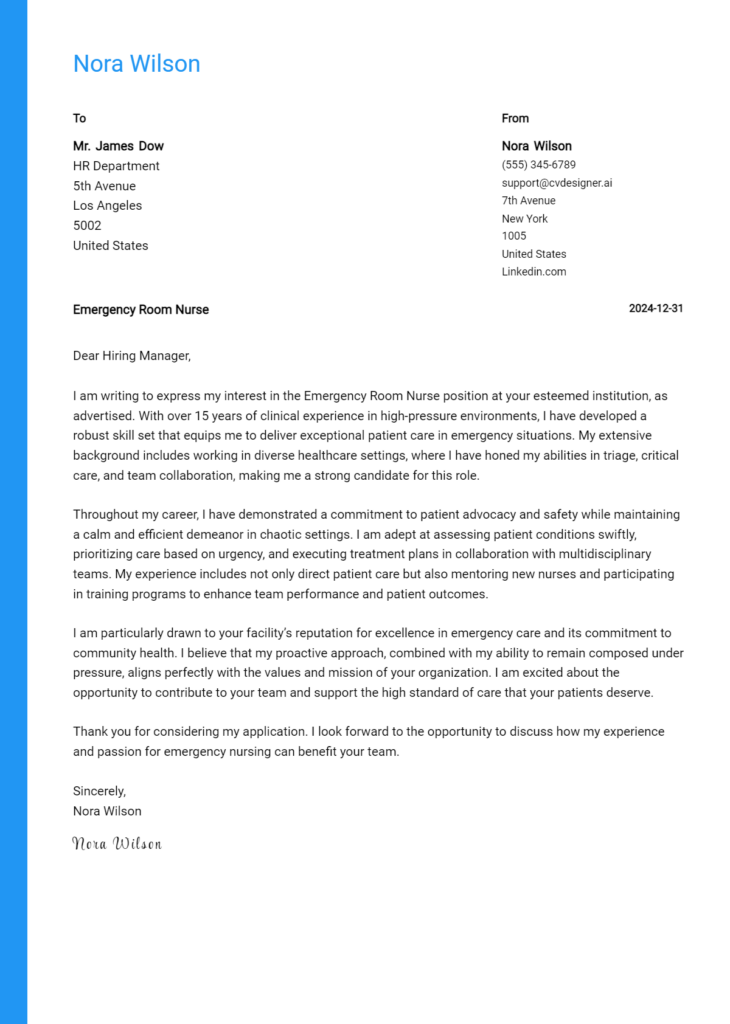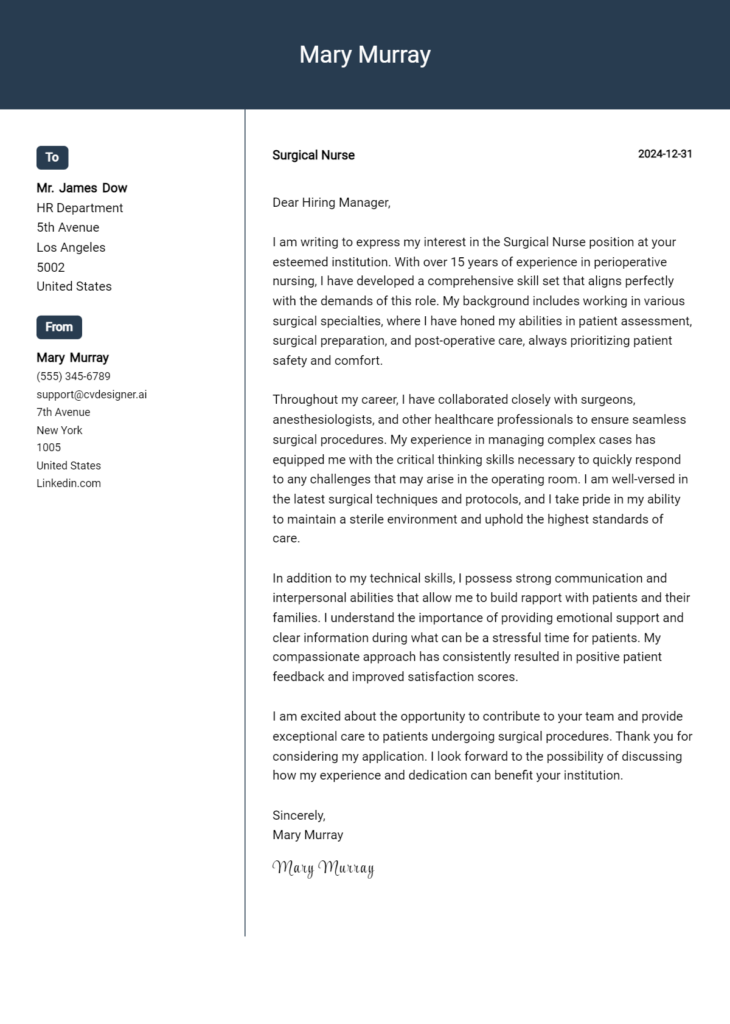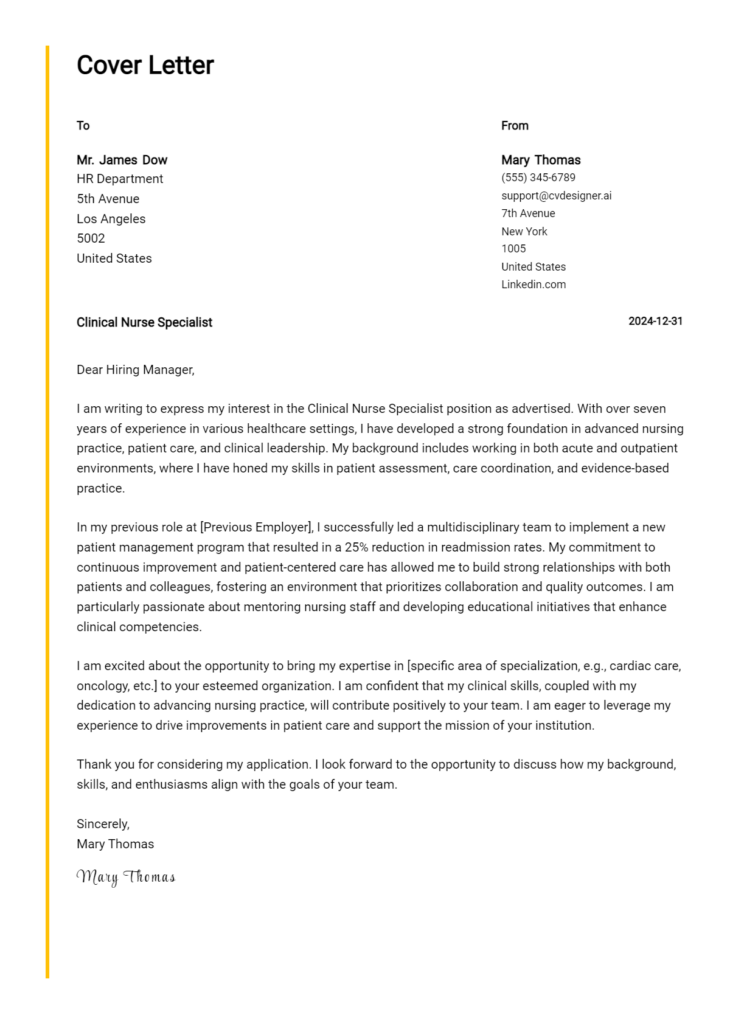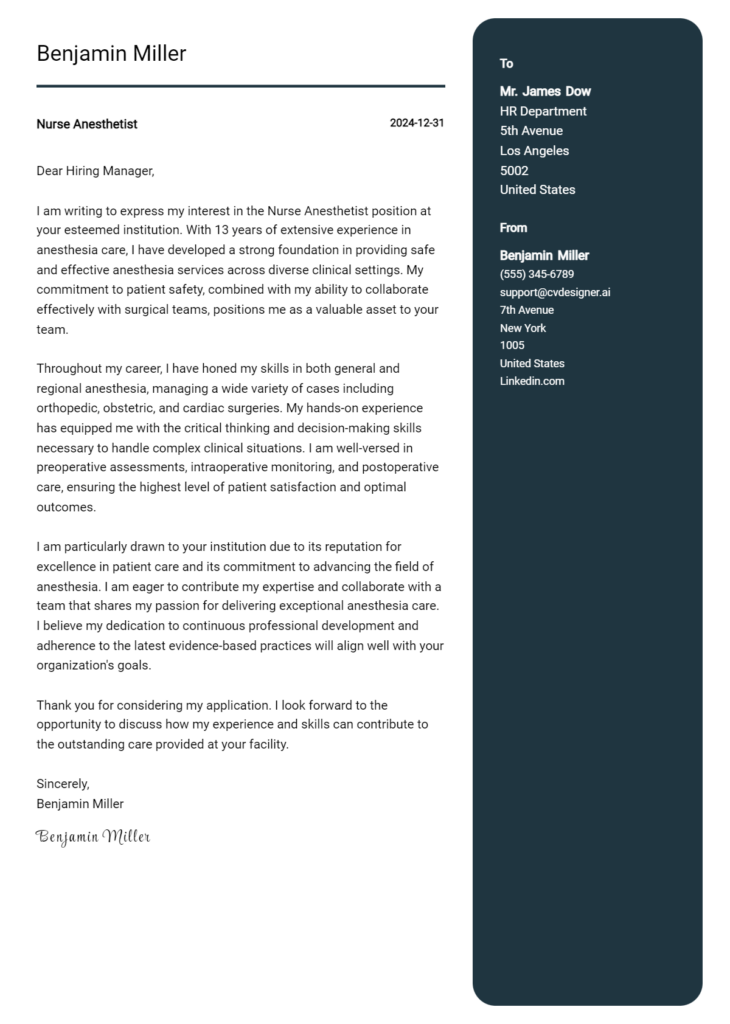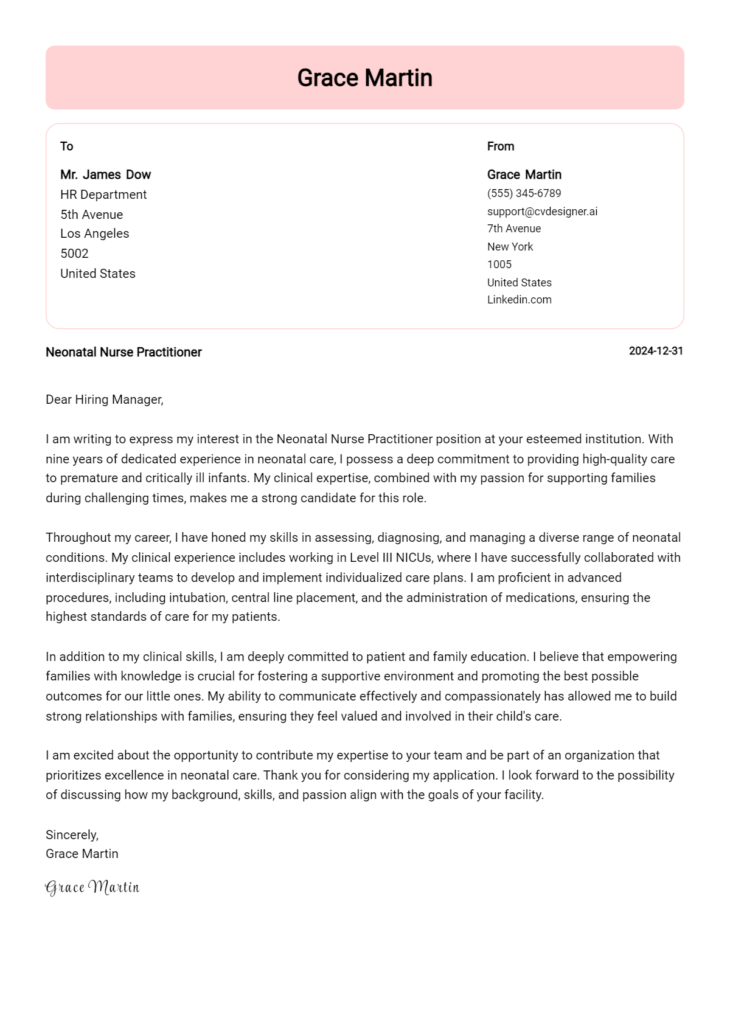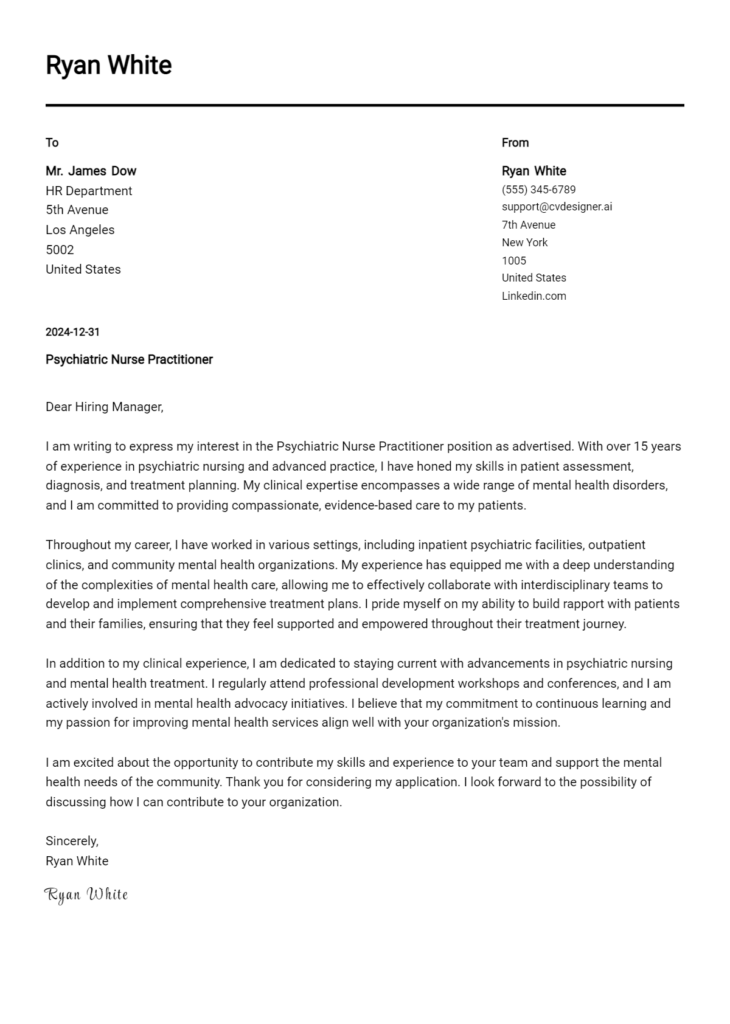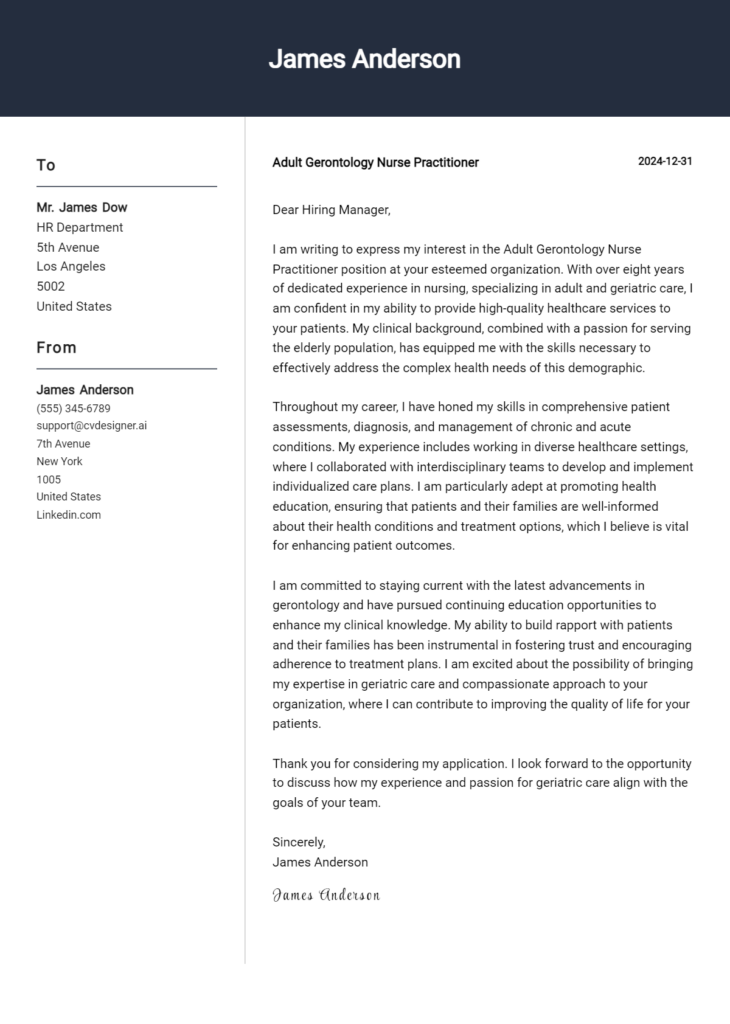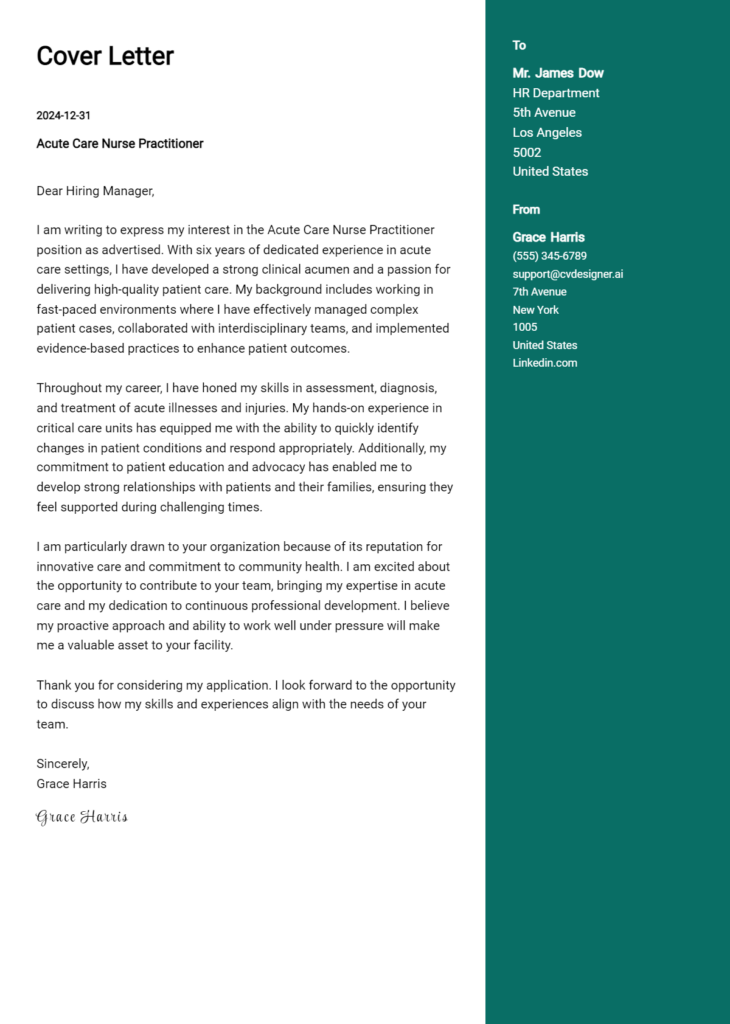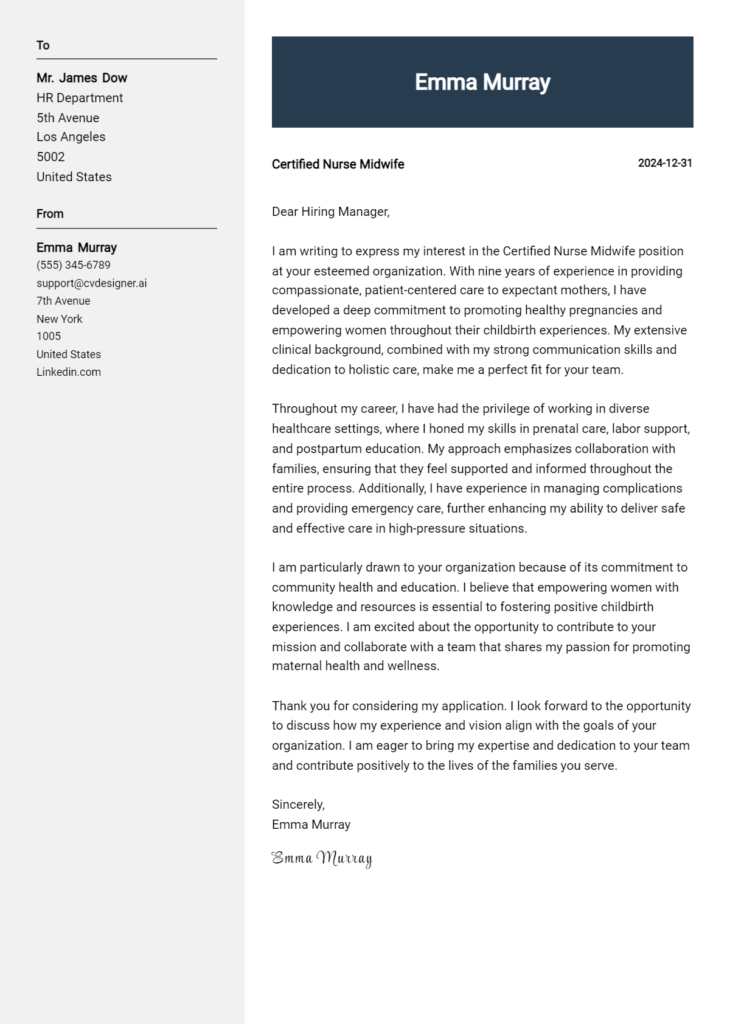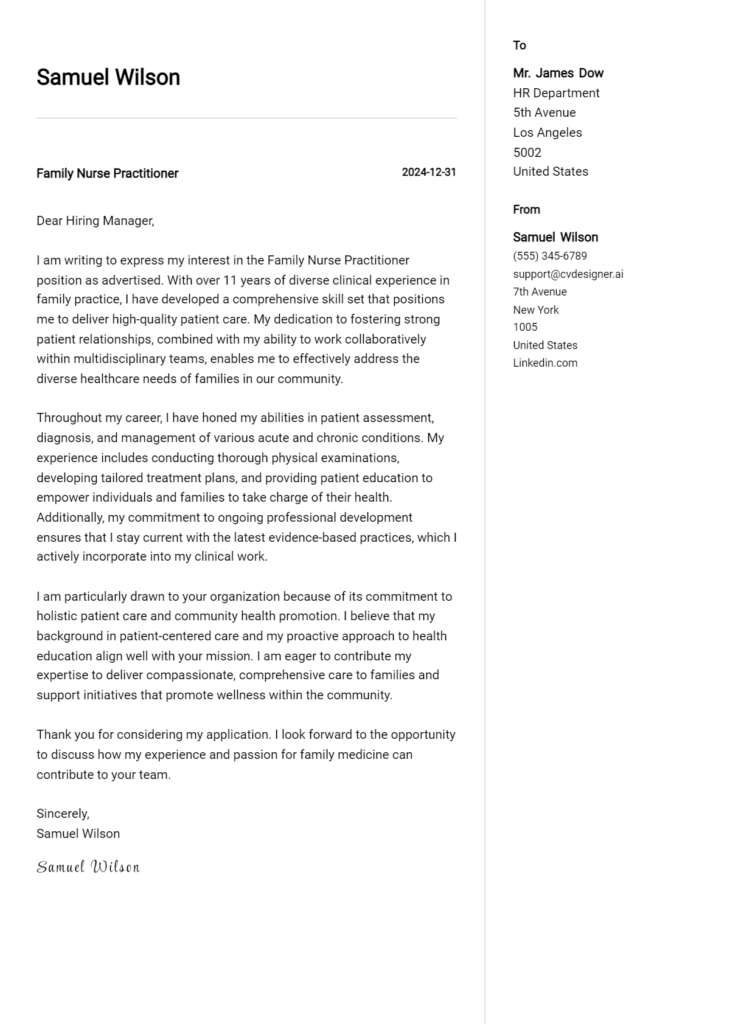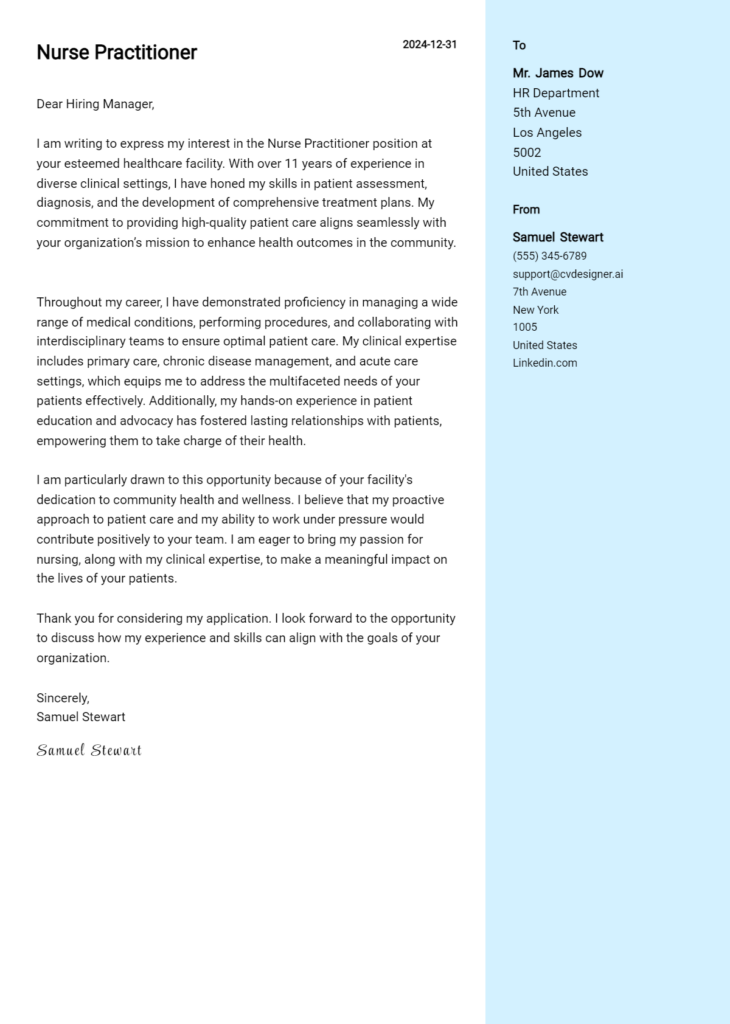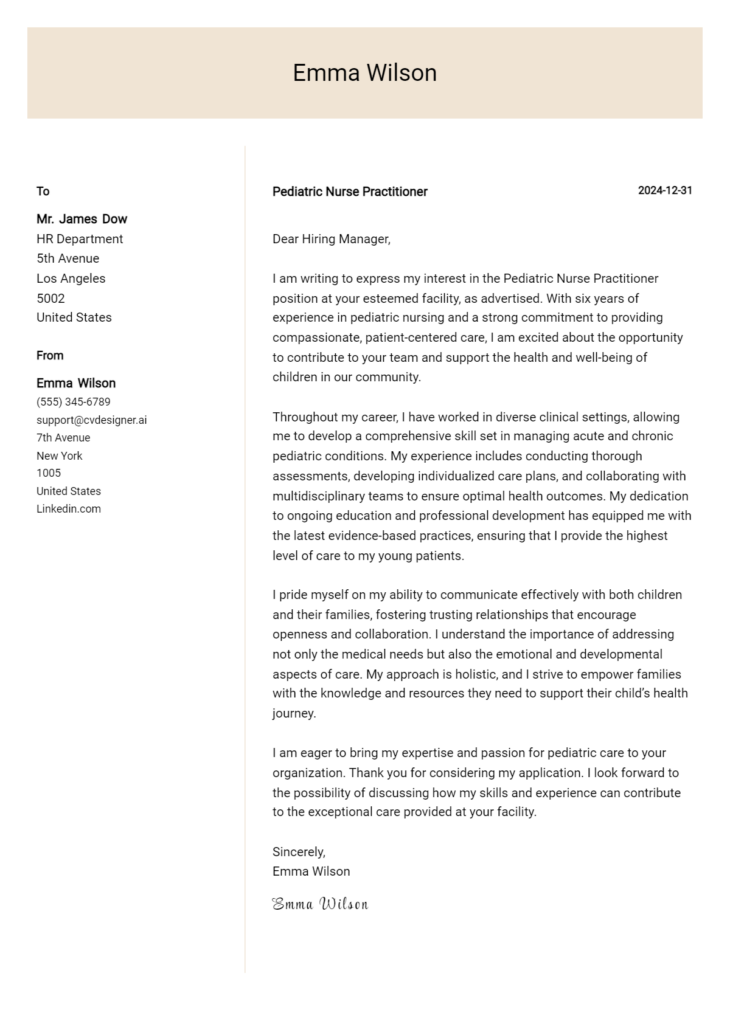Registered Nurse Cover Letter Examples
Explore additional Registered Nurse cover letter samples and guides and see what works for your level of experience or role.
How to Format a Registered Nurse Cover Letter?
Crafting a compelling cover letter is essential for Registered Nurses, as it serves as your first opportunity to make a lasting impression on potential employers. A well-structured cover letter not only highlights your qualifications and experience but also demonstrates your commitment to providing exceptional patient care—a critical aspect of nursing. The way you format your cover letter can reflect your professionalism and attention to detail, qualities that are highly valued in the healthcare field.
In this guide, we will explore how to effectively structure your cover letter, providing insights and nurse-specific examples to help you create a persuasive document.
We will focus on the essential components of a professional cover letter, including:
- Cover Letter Header
- Cover Letter Greeting
- Cover Letter Introduction
- Cover Letter Body
- Cover Letter Closing
Each section is crucial in showcasing your skills and dedication as a Registered Nurse. Let’s break down each part to help you craft a standout cover letter.
Importance of the Cover Letter Header for a Registered Nurse
The cover letter header is a critical component of your application as a Registered Nurse. It sets the tone for your professionalism and provides essential information about you and your intended recipient. A well-structured header should include your contact information, the date, and the recipient's details. Clarity and professionalism are key, as this first impression can significantly influence how your application is perceived. An effective header conveys your attention to detail and respect for the hiring process, while a poorly constructed one may detract from your overall message.
Strong Example
Jane Doe 123 Health St. Nurseville, ST 12345 (123) 456-7890 jane.doe@email.com October 1, 2023 Hiring Manager ABC Hospital 456 Care Ave. Wellness City, ST 67890
Weak Example
Jane Nurse 12345 (123) jane@email.com 10/1/23 Manager Hospital 456 Care
The Importance of the Cover Letter Greeting for a Registered Nurse
The greeting of your cover letter is a critical element that sets the tone for the rest of your application. It serves as your first impression, demonstrating professionalism and a personal touch right from the start. By addressing the hiring manager directly, you show that you have taken the time to research the organization and its staff, which reflects your genuine interest in the position. Avoiding generic greetings like "To Whom It May Concern" can help distinguish your application from others and create a connection with the reader. If possible, take the time to find out the name of the hiring manager or recruiter; this small effort can significantly enhance your greeting.
Here are examples of strong and weak greetings for a Registered Nurse cover letter:
Strong Greeting Example
Dear Ms. Johnson,
Weak Greeting Example
To Whom It May Concern,
Importance of a Well-Crafted Cover Letter Introduction for a Registered Nurse
A well-crafted cover letter introduction is crucial for a Registered Nurse as it serves as the first impression to the hiring manager. This opening paragraph not only captures attention but also sets the tone for the rest of the application. By expressing genuine interest in the position and briefly highlighting key skills or achievements, candidates can effectively distinguish themselves from other applicants. A strong introduction can create a lasting impact, encouraging the reader to delve deeper into the candidate's qualifications and experience. Below are examples of both strong and weak cover letter introductions for a Registered Nurse role.
Strong Example
Dear [Hiring Manager's Name], As a dedicated and compassionate Registered Nurse with over five years of experience in delivering high-quality patient care, I am excited to apply for the position at [Hospital/Facility Name]. My background in acute care settings, coupled with my commitment to patient advocacy, has equipped me with the skills needed to excel in this role. I am particularly drawn to your institution's emphasis on holistic patient care, and I am eager to contribute to your team with my expertise in [specific skills or achievements relevant to the job].
Weak Example
To whom it may concern, I am writing to apply for the Registered Nurse position. I have worked as a nurse for a few years and have done various things. I think I would be good for this job because I need a new opportunity. I hope you consider my application.
Purpose of the Cover Letter Body for a Registered Nurse
The body of a cover letter for a Registered Nurse serves as a critical opportunity to convey the candidate's qualifications, expertise, and the unique value they can bring to the healthcare organization. This section should detail the nurse's relevant skills, such as patient care, teamwork, and clinical knowledge, as well as highlight specific projects or accomplishments that demonstrate their ability to excel in the role. By articulating experiences in areas like improving patient outcomes, leading nursing initiatives, or participating in interdisciplinary teams, the candidate can effectively showcase their professional journey and how it aligns with the needs of the employer.
Strong Example
In my previous position at City Hospital, I successfully led a quality improvement project aimed at reducing patient readmission rates for chronic heart failure patients. By collaborating with a multidisciplinary team, we developed a comprehensive discharge planning protocol that included patient education and follow-up scheduling. This initiative resulted in a 20% decrease in readmission rates over six months, demonstrating my commitment to patient-centered care and my ability to drive positive outcomes within a healthcare setting. Additionally, my experience in administering critical care and my certification in Advanced Cardiac Life Support ensure I can provide high-quality care in fast-paced environments.
Weak Example
I have experience as a nurse and I work well with patients. I have taken care of many different types of patients and I think I would be a good fit for your hospital. I am also a team player and I like to help others. I am looking for a job where I can use my skills.
Importance of the Cover Letter Closing for a Registered Nurse
The closing paragraph of a cover letter is crucial for Registered Nurses as it serves as a final opportunity to summarize qualifications, reiterate enthusiasm for the position, and encourage the hiring manager to take the next steps, such as reviewing the resume or scheduling an interview. A strong closing leaves a positive impression and reinforces the candidate's suitability for the role, while a weak closing may diminish the overall impact of the application.
Strong Example
Thank you for considering my application for the Registered Nurse position at [Hospital Name]. I am eager to bring my diverse clinical skills and compassionate patient care approach to your team. I believe my experience in both acute and chronic care settings aligns well with your needs. I look forward to the opportunity to discuss how I can contribute to your esteemed organization. Please feel free to contact me to schedule an interview at your earliest convenience. Thank you again for your time and consideration.
Weak Example
I hope you liked my application. I think I would be a good nurse. Please look at my resume. I guess I can talk more if you want to.
Crafting an effective cover letter is crucial for Registered Nurse candidates looking to stand out in a competitive job market. A well-written cover letter not only highlights your qualifications but also allows you to showcase your technical skills, problem-solving abilities, and commitment to teamwork and continuous learning. The following tips will guide you in creating a compelling cover letter that reflects your strengths and passion for nursing.
Tips for Writing a Registered Nurse Cover Letter
Showcase Your Technical Skills
Begin by emphasizing your technical nursing skills, such as proficiency with electronic health records (EHRs), medication administration, and patient assessment techniques. Mention specific certifications that enhance your qualifications, such as BLS or ACLS. This demonstrates your readiness to tackle the technical demands of the job.Highlight Problem-Solving Abilities
Use specific examples to illustrate your problem-solving skills. Describe a challenging situation you faced in a clinical setting and how you successfully navigated it. This not only showcases your critical thinking but also reassures potential employers of your ability to handle high-pressure situations effectively.Emphasize SDLC Knowledge
If applicable, include any knowledge of the Software Development Life Cycle (SDLC) as it relates to healthcare technologies. Highlight experiences where you contributed to the implementation or improvement of health information systems, showcasing your ability to adapt to evolving technological landscapes in nursing.Demonstrate Teamwork
Nursing is a collaborative profession, so it's essential to convey your teamwork skills. Discuss your experiences working with multidisciplinary teams to deliver patient care. Share specific instances where your collaboration with other healthcare professionals led to improved patient outcomes, emphasizing your ability to communicate effectively and foster a positive team environment.Express a Passion for Continuous Learning
The healthcare field is constantly evolving, and employers value candidates who are committed to professional development. Mention any ongoing education, workshops, or certifications you are pursuing. This demonstrates your willingness to stay current with industry trends and enhances your appeal as a candidate dedicated to providing the best care possible.
By incorporating these tips into your cover letter, you can effectively convey your qualifications and passion for nursing. For additional resources, consider using cover letter templates to structure your letter or a cover letter builder to streamline the writing process.
Common Mistakes to Avoid in a Registered Nurse Cover Letter
Crafting an effective cover letter is essential for standing out in the competitive field of nursing. Avoiding common mistakes can significantly enhance your chances of making a positive impression on potential employers. Some frequent pitfalls include:
- Generic Greetings: Starting with "To Whom It May Concern" lacks personalization. Instead, research and address the letter to a specific hiring manager.
- Repeating Your Resume: Simply summarizing your resume can bore readers. Instead, highlight unique experiences and skills that make you a standout candidate.
- Overly Long Letters: A cover letter should be concise, ideally one page. Aim for clarity and brevity to maintain the reader's attention.
- Neglecting Formatting: Poor formatting can make your letter difficult to read. Use a clean, professional layout that follows cover letter format.
- Lack of Specificity: Failing to mention the specific role or organization can make your letter feel generic. Tailor your content to the job you are applying for.
- Ignoring the Job Description: Not aligning your skills with the job requirements can weaken your application. Use keywords from the job description to demonstrate your fit.
- Spelling and Grammar Errors: Typos can undermine your professionalism. Always proofread and consider using tools or a second set of eyes before submission.
By steering clear of these common mistakes, you can create a compelling cover letter that showcases your qualifications and enthusiasm for the nursing position. For more inspiration, check out some cover letter examples to help you get started.
Cover Letter FAQs for Registered Nurse
What should I include in my cover letter as a Registered Nurse?
Your cover letter should highlight your nursing qualifications, including your degree, certifications, and relevant experience. Begin with a compelling introduction that states the position you are applying for and your enthusiasm for the role. Include specific examples of your clinical skills, such as patient care, emergency response, or teamwork. Additionally, mention any specialties or areas of expertise, like pediatrics or geriatrics, that align with the job description. Finally, express your commitment to patient care and how your values align with the organization’s mission. Always close with a call to action, inviting the employer to review your resume and consider you for an interview.
How can I make my cover letter stand out?
To make your cover letter memorable, personalize it for each application. Research the healthcare facility and reflect its values in your writing. Use a professional but engaging tone. Incorporate keywords from the job posting to demonstrate your fit for the role. Highlight unique experiences or accomplishments that set you apart, such as leadership roles or specialized training. Use quantifiable achievements—like the number of patients cared for or improvements in patient satisfaction scores—to showcase your impact. Finally, keep your formatting clean and easy to read, and ensure there are no grammatical errors or typos, as attention to detail is critical in nursing.
Should I include my nursing license in my cover letter?
While it’s not necessary to include your nursing license number in your cover letter, you should definitely mention your current licensure status. State the type of nursing license you hold and the state in which it is issued, confirming that you are in good standing. This information reassures employers of your qualifications and legal ability to practice. If you have any additional certifications or specializations, such as ACLS or PALS, list them as well to enhance your credibility. Remember, your cover letter is an opportunity to showcase not just your skills, but also your professionalism and commitment to nursing standards.
Is it important to tailor my cover letter for each job application?
Yes, tailoring your cover letter for each job application is crucial. A generic cover letter may give the impression that you are not genuinely interested in the specific position or organization. By customizing your letter, you demonstrate your understanding of the role and how your skills and experiences align with the needs of the employer. Reference the specific unit or department if applicable, and address the letter to the hiring manager by name whenever possible. This shows initiative and a personalized approach. Additionally, customizing your cover letter allows you to highlight the most relevant aspects of your background, making a stronger case for why you are the best candidate for the job.
Build your Cover Letter in minutes
Use an AI-powered cover letter builder and have your letter done in 5 minutes. Just select your template and our software will guide you through the process.

